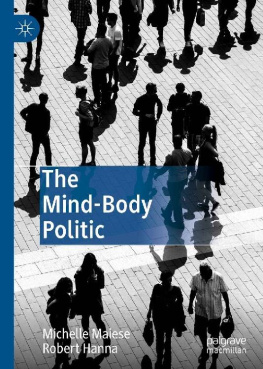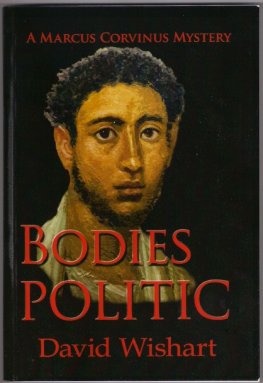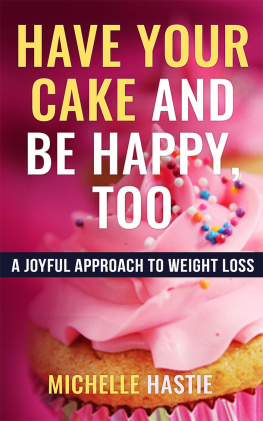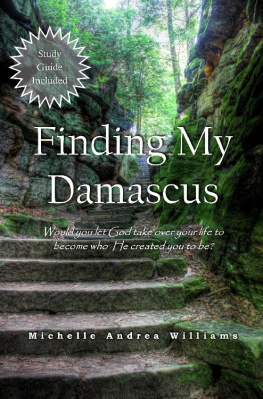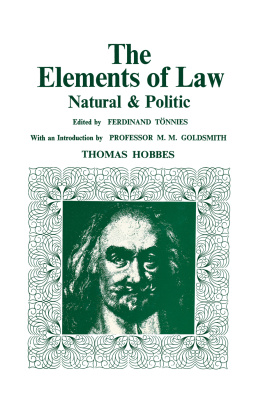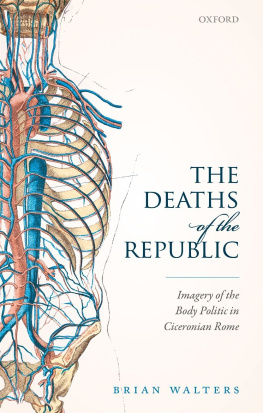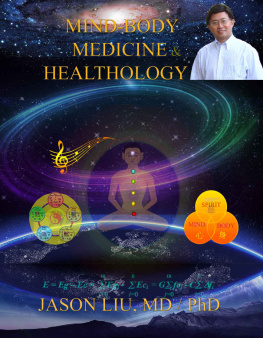Michelle Maiese - The Mind-Body Politic
Here you can read online Michelle Maiese - The Mind-Body Politic full text of the book (entire story) in english for free. Download pdf and epub, get meaning, cover and reviews about this ebook. year: 2019, publisher: Springer International Publishing, genre: Science / Politics. Description of the work, (preface) as well as reviews are available. Best literature library LitArk.com created for fans of good reading and offers a wide selection of genres:
Romance novel
Science fiction
Adventure
Detective
Science
History
Home and family
Prose
Art
Politics
Computer
Non-fiction
Religion
Business
Children
Humor
Choose a favorite category and find really read worthwhile books. Enjoy immersion in the world of imagination, feel the emotions of the characters or learn something new for yourself, make an fascinating discovery.
- Book:The Mind-Body Politic
- Author:
- Publisher:Springer International Publishing
- Genre:
- Year:2019
- Rating:5 / 5
- Favourites:Add to favourites
- Your mark:
- 100
- 1
- 2
- 3
- 4
- 5
The Mind-Body Politic: summary, description and annotation
We offer to read an annotation, description, summary or preface (depends on what the author of the book "The Mind-Body Politic" wrote himself). If you haven't found the necessary information about the book — write in the comments, we will try to find it.
The Mind-Body Politic — read online for free the complete book (whole text) full work
Below is the text of the book, divided by pages. System saving the place of the last page read, allows you to conveniently read the book "The Mind-Body Politic" online for free, without having to search again every time where you left off. Put a bookmark, and you can go to the page where you finished reading at any time.
Font size:
Interval:
Bookmark:

Cover illustration: Finchley Thompson / Alamy Stock Photo
This Palgrave Macmillan imprint is published by the registered company Springer Nature Switzerland AG
The registered company address is: Gewerbestrasse 11, 6330 Cham, Switzerland
A few months ago, Michelle asked her students , on the first day of their Fall Semester class on Theories of Human Nature, to consider their level of agreement with respect to a series of claims about human nature and motivation. The four corners of her classroom were labeled Strongly Agree, Agree, Disagree, and Strongly Disagree. As she read out each claim, students moved to different parts of the classroom. Some topics were more controversial than others. When it came to God and gender , for example, views were highly mixed. Some students indicated their strong belief that in order to gain a better understanding of human nature, we need to talk about God, whereas others said that they thought God was irrelevant. Some students expressed their belief that human nature did not vary according to biological sex, whereas others said they believed that there were inborn differences between men and women.
One topic, however, attracted widespread agreement: In their natural state, humans are fundamentally competitive and self-interested . At this point in the class, almost all of the students were huddled together under the strongly agree or agree labels. When asked to explain why they agreed, several students cited our human drive to survive, and also added that their primary reasons for attending college were to compete in the workforce and advance their own interests.
A few of them lingered in the center of the classroom, which Michelle had designated as a space for those who were uncertain. One of the students said she thought that parents sometimes exhibited genuine self-sacrifice, but then a student who strongly agreed with the statement expressed a classical Hobbesian view nowadays called psychological egoism: she asserted that all human choice and action are inherently self-interested and that even behavior that appeared altruistic was in fact motivated, at bottom, by self-interest .
Why are so many of us convinced that this Hobbesian view is true? And why is it that whenever contemporary college or university professors query students about their reasons for pursuing post-secondary education, they begin to describe their future career plans without missing a beat? Why do other concernssuch as becoming a more informed voter or a more engaged citizen; gaining knowledge about social injustice; being able to think more critically about politics and current events; pursuing a morally good life; or crafting a meaningful philosophy of lifeso rarely even get mentioned ?
To be sure, these concerns have not completely disappeared from the lives of people under the age of 40. Look, for example, at the sharp rise in interest in democratic socialism and socialanarchism (aka anarcho-socialism ) displayed by millennials since the Occupy movement in the late 00s, and especially since The Age of Trump-POTUS began in 2016. However, its clear that the main focus of these current students lies elsewhere, namely on their future career prospects. As a result, their natural curiosity and love of learning for its own sake, or for the sake of other higher intrinsic values like living a good life or living a meaningful life, has greatly diminished, and many even view their university education as nothing but a burden that they must endure. Its something that they have to do , and that they dread , as part of the obligatory pathway to gainful employment. They resent being told that its a privilege or that they are lucky to be in college or university. Even those few who retain their love of learning for its own sake, or who still think about living a morally good life or crafting a meaningful life-philosophy, come to view their stint in higher education in largely instrumental terms, as nothing but a means to an end.
For many or even most of them, the very idea of making carefully thought-out choices about which academic programs to pursue, in light of their unique interests and passions, is largely irrelevant; above all, they think they need to follow a path that will lead them to a comfortable middleclass or upper-middleclass lifestyle. Subjects like philosophy, which offer no such clear path to this goalor even worse, which may seem to offer only a long and winding road away from this goaltake on an air of futility, or at best, of mystery. What can you do with a degree in philosophy? students and administrators alike frequently ask. And if a professor replies that someone can do anything after majoring in philosophy, people are likely to be deeply dissatisfied with this response. Whereas philosophy once was thought to play a crucial role in critical, reflective self-knowledge and in educating people for their role as citizens, todays all-encompassing emphasis on economic innovation and competitiveness, as an inevitable feature of human life , can make studying or pursuing philosophy seem like an utter waste of time and effort. Unfortunately, and not surprisingly, many colleges and universities are responding to this crisis in the humanities by cutting back, or even eliminating, their philosophy programs.
According to this way of thinking, going to college or university is just for professionaladvancement and landing a good job , and even more distressingly, its not only the students who think so. During professional academic faculty and administrative meetings, there is all-too-frequent talk about competitor schools, value for the money, sustainability, and the need for a return on investment. Educational outcomes increasingly are defined and assessed in relation to what sort of job undergraduate students have obtained one to five years after graduation. At tuition-driven liberal arts colleges, in particular, professors and administrators need to be very skillful at gauging the level of student interest in various subjects, and tailoring their curriculum to whatever the students say they want. There is a demand to market their courses, their departments, and their colleges and universities, so that students will show up in sufficient numbers and they wont have to close their doors. The sad and even tragic fact is that at most contemporary institutions of higher education, a departments performance is measured solely by the number of undergraduate majors and graduates, the total number of students enrolled in courses, the number of graduate students who get professional academic jobs, the number of publications produced by faculty members, and discipline-wide rankings.
Font size:
Interval:
Bookmark:
Similar books «The Mind-Body Politic»
Look at similar books to The Mind-Body Politic. We have selected literature similar in name and meaning in the hope of providing readers with more options to find new, interesting, not yet read works.
Discussion, reviews of the book The Mind-Body Politic and just readers' own opinions. Leave your comments, write what you think about the work, its meaning or the main characters. Specify what exactly you liked and what you didn't like, and why you think so.

